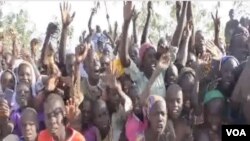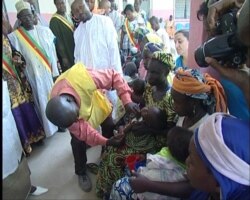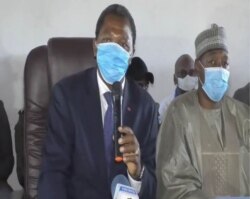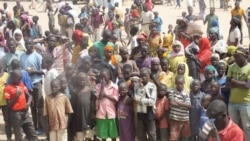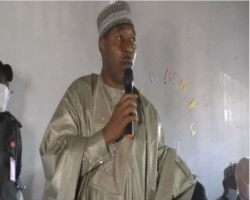Cameroon says 5,000 of the 103,000 Nigerians, mostly women and children, who fled across the border from Boko Haram terrorists have agreed to return to Nigeria.
Government officials from the two countries, meeting in the northern Cameroonian town of Maroua, agreed Nigeria would reintegrate the displaced people and provide security.
Cameroon announced Friday that the departure date is set for February 27.
Most of those displaced volunteered to return to Borno state when Nigeria assured them Boko Haram is no longer a major danger, according to Benjamin Ojioko, spokesperson for the Nigerians in Cameroon's Far North region, which shares a border with Nigeria's Borno state, a former Boko Haram epicenter.
"It is not that they are not feeling fine here, but we usually say that home is the best place," Ojioko said. "We thank the Nigerian government and Cameroon for what they are doing so that our brothers can go back to Nigeria. We have been here for long."
Both Cameroon and Nigeria say 5,096 refugees agreed to return to Nigeria during the first phase of the voluntary repatriation exercise. Of that group, 285 are over 60 years old and more than 1,100 are between a month and 4 years old. About 2,700 are women.
A declaration read in Maroua said Nigeria and Cameroon promised in a commission meeting to ensure that those returning are safe from Boko Haram and COVID-19.
"The commission agreed to facilitate the safe and dignified return movement using buses for individuals with social distancing and trucks for luggage by road with security and medical escorts," according to the declaration. "The voluntary repatriation will be done in adherence to the agreed COVID-19 protocols in both countries."
Paul Atanga Nji, Cameroon's territorial administration minister, represented his country at the meeting. He says negotiations are continuing, to assure the 98,000 Nigerians who are still reluctant to return that peace is finally returning to their country.
"[Cameroonian] President Paul Biya and [Nigerian] President Muhammadu Buhari have insisted that we have to respect the international convention which recommends the voluntary, voluntary return of the citizens who are here," Nji said. "As we are going back, there is hope and there is joy as for the 5,000 who will be [leaving] in the first place. But it is an ongoing process."
Among the displaced Nigerians who say they have yet to decide whether they will go back is 49-year-old Ousman Sani. Sani said he has been earning a living in Cameroon since 2013 as a cattle rancher, and does not know if he will find a job and peace in his town of Bama, in northern Nigeria. He says he does not know if his destroyed home will be rebuilt by his government.
"We are in good relationship with the host community. It is just that at first, we don't [didn't] understand their language and they too, they do not understand our language. It is a problem of a language barrier but now we are living in peace," Sani said.
Cameroon says of the 103,000 displaced Nigerians in the central African state, about 68,000 are at the Minawao refugee camp and 35,000 live with host communities. Ninety-five percent of the displaced Nigerians are from Borno state. Very often, they are given humanitarian assistance by the United Nations, nongovernmental organizations and Cameroon.
Babagan Umara Zulum, the governor of Nigeria's Borno state and head of the Nigerian delegation to Maroua, said he is grateful for the assistance given to the refugees.
"I wish to sincerely convey our deep appreciation to the government of Cameroon and the distinguished leadership of President Paul Biya for the enormous support he has been rendering towards uplifting the standards of living of the displaced communities of Borno state taking refuge in the Minawao [refugee] camp. We remain eternally grateful," he said.
Zulum said Nigeria will socially and economically reintegrate the refugees as soon as they return. He also assured them of safety when they return to Maiduguri and their towns and villages in the areas of Ngala, Bama and Gwoza.
According to the U.N., 11 years of Boko Haram violence has displaced more than 2.7 million people, including some 210,000 Nigerians, into neighboring countries. Nearly 30,000 people have died during the Islamic extremist group's 11-year-old uprising.




